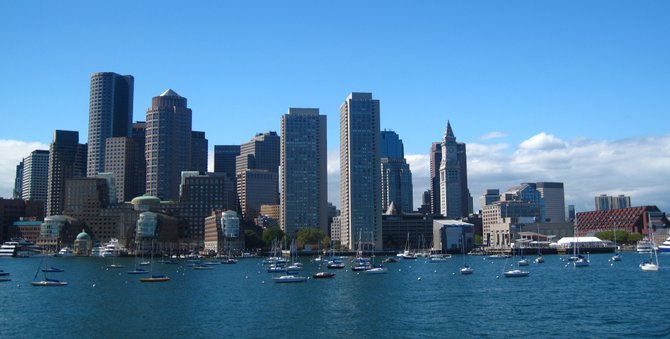Some scientists are predicting that, due to our negative impact on the ecosystem, waterfront cities such as Boston and New York might disappear in the next century. Photo by Kathleen M. Mitchell.
I needed to get away. So I used my frequent-flyer miles saved up from the past decade, made plans to stay with a friend in Chinatown and went to Boston. Over one short weekend, I drank a phenomenally delicious avocado-date-kale-banana-almond smoothie at Life Alive and a mango-basil mojito at Wagamama. I stumbled upon Shakespeare in the Park in Boston Common. I walked barefoot for hours at the Arnold Arboretum. I people-watched over a latte in Harvard Square. I sat on a bench along the Charles River, deep in conversation with an old friend long after dark. I saw some college kids jump naked into the river. I wandered. I ate raw chocolate. I stuffed my face at an amazing Indian vegetarian restaurant. I met some cool people who totally belong in my tribe. I recharged my batteries. It was divine. And I wasn't quite ready to come home to Mississippi.
After I got home, totally blissed out on Boston, a Huffington Post article caught my eye. I read that as a result of rising sea levels related to global warming, Boston may not exist in 100 years.
OK, whoa. My great-granddaughter can't get away for a weekend to Boston? Or New York City? She can't take an eating tour of Boston's Little Italy or choose to be a writer living in a tiny studio apartment in Brooklyn?
This got my blood pounding. In my 20s, I got totally burned out and overwhelmed by dire environmental statistics and doomsday global warming scenarios. No Boston? That stuff stresses me out and makes me feel like I want to shut down rather than be proactive about being a part of the solution. But I do so want to be a part of creating a future in this world in which my child and my grandchildren can not only survive, but thrive. And go to Boston. This is one of the reasons why I try to live a little greener.
It is a process. Everyone makes different choices and has different priorities. Everyone is a different shade of green. What small changes can you make in your life today to help protect our planet for future generations?
Green Books for Kids
"Just a Dream," by Chris Van Allsburg (HMH Books, 2011, $8.99)
"The New 50 Simple Things Kids Can Do to Save the Earth," by Sophie Javna (Andrews McMeel Publishing, 2009, available used from Amazon.com and other booksellers)
"If the World Were a Village: A Book About the World's People," by David Smith (Kids Can Press, 2011, $18.95)
"I Can Make a Difference A Treasury to Inspire Our Children," by Marian Wright Edelman (Amistad, 2005, $21.99)
Green Books for Grownups
"Urban Homesteading: Heirloom Skills for Sustainble Living," by Rachel Kaplan and K. Ruby Blume (Skyhorse Publishing, 2011, $19.95)
"The Small House Book," by Jay Shafer (Tumbleweed Tiny House, 2009, available used from Amazon.com and other booksellers)
"Me to We: Finding Meaning in a Material World," by Craig Kielburger and Marc Kielburger (Touchstone, 2008, $19.99)
"The Self-Sufficient Life and How to Live it," by John Seymour (DK Publishing, 2009, $35)
Green Apps (all free on iTunes)
One Stop Green
Healthy Child, Healthy World
Project Noah
At Home
• Incorporate a few meatless meals each week.
• Recycle.
• Share with your neighbors.
• Use less air conditioning.
• Hang laundry on the clothesline.
• Experiment with more environmentally friendly cleaning and personal-care products.
At the Store
• Carry reusable bags with you.
• Swap incandescent for fluorescent light bulbs.
• Shop at the farmers market for local, seasonal produce.
• Buy in bulk.
• Choose more efficient appliances and automobiles.
• Buy gently used clothing at cool places like Orange Peel and N.U.T.S.
At School & Work
• Carpool.
• Use recycled paper.
• Install motion-sensor lights in areas such as bathrooms.
• Consider a schedule such as four 10-hour days, or working partially from home, which will reduce pollution from the daily commute.
With Kids
• Pick up trash around the neighborhood.
• Go camping and hiking.
• Sort recyclables together.
• Go thrifting.
• Make do with less.



Comments
Use the comment form below to begin a discussion about this content.
comments powered by Disqus